Project Management Methodologies PPMP20009: Consolidated Portfolio
VerifiedAdded on 2023/06/11
|38
|9184
|418
Portfolio
AI Summary
This consolidated portfolio assesses project management topics through 10 weekly submissions, focusing on three learning outcomes: reasons for adopting project management methodologies, impact of these methodologies on stakeholders, and justification for choosing methodologies to meet organizational needs. It discusses the evolution of project management, the importance of stakeholder management, and key elements of project initiation, planning, execution, and closure. The portfolio also compares Waterfall and Agile methodologies, highlighting their respective strengths and applications. Evidence from the student's workplace experience supports the analysis, demonstrating practical application of theoretical concepts. Desklib provides access to similar assignments and resources for students.

PROJECT MANAGEMNET METHODOLOGIES
PPMP20009
Consolidated Portfolio
STUDENT NAME: <insert>
STUDENT ID: <insert>
LECTURER: <insert>
CAMPUS: <insert>
TERM: 1, 2018
PPMP20009
Consolidated Portfolio
STUDENT NAME: <insert>
STUDENT ID: <insert>
LECTURER: <insert>
CAMPUS: <insert>
TERM: 1, 2018
Paraphrase This Document
Need a fresh take? Get an instant paraphrase of this document with our AI Paraphraser
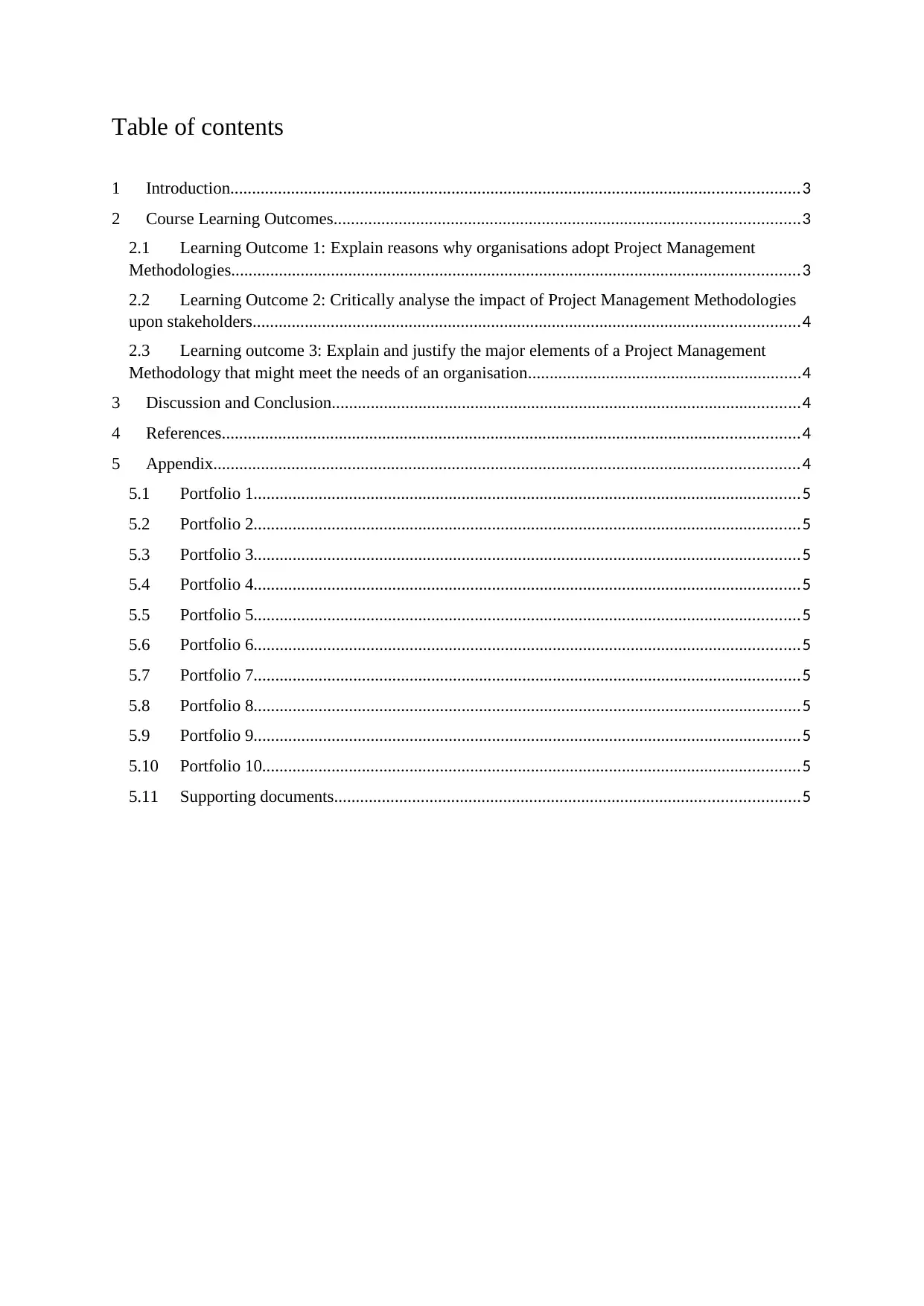
Table of contents
1 Introduction...................................................................................................................................3
2 Course Learning Outcomes...........................................................................................................3
2.1 Learning Outcome 1: Explain reasons why organisations adopt Project Management
Methodologies...................................................................................................................................3
2.2 Learning Outcome 2: Critically analyse the impact of Project Management Methodologies
upon stakeholders..............................................................................................................................4
2.3 Learning outcome 3: Explain and justify the major elements of a Project Management
Methodology that might meet the needs of an organisation...............................................................4
3 Discussion and Conclusion............................................................................................................4
4 References.....................................................................................................................................4
5 Appendix.......................................................................................................................................4
5.1 Portfolio 1..............................................................................................................................5
5.2 Portfolio 2..............................................................................................................................5
5.3 Portfolio 3..............................................................................................................................5
5.4 Portfolio 4..............................................................................................................................5
5.5 Portfolio 5..............................................................................................................................5
5.6 Portfolio 6..............................................................................................................................5
5.7 Portfolio 7..............................................................................................................................5
5.8 Portfolio 8..............................................................................................................................5
5.9 Portfolio 9..............................................................................................................................5
5.10 Portfolio 10............................................................................................................................5
5.11 Supporting documents...........................................................................................................5
1 Introduction...................................................................................................................................3
2 Course Learning Outcomes...........................................................................................................3
2.1 Learning Outcome 1: Explain reasons why organisations adopt Project Management
Methodologies...................................................................................................................................3
2.2 Learning Outcome 2: Critically analyse the impact of Project Management Methodologies
upon stakeholders..............................................................................................................................4
2.3 Learning outcome 3: Explain and justify the major elements of a Project Management
Methodology that might meet the needs of an organisation...............................................................4
3 Discussion and Conclusion............................................................................................................4
4 References.....................................................................................................................................4
5 Appendix.......................................................................................................................................4
5.1 Portfolio 1..............................................................................................................................5
5.2 Portfolio 2..............................................................................................................................5
5.3 Portfolio 3..............................................................................................................................5
5.4 Portfolio 4..............................................................................................................................5
5.5 Portfolio 5..............................................................................................................................5
5.6 Portfolio 6..............................................................................................................................5
5.7 Portfolio 7..............................................................................................................................5
5.8 Portfolio 8..............................................................................................................................5
5.9 Portfolio 9..............................................................................................................................5
5.10 Portfolio 10............................................................................................................................5
5.11 Supporting documents...........................................................................................................5

Without going overboard, when formatted item 1 to 3 below will be most likely 4 to 5 pages. It
might be more, but it should not be less. Each learning outcome (LO) would contain two to three
paragraphs. The important thing is to say in the LO section how the student achieved the LO.
This is done through the summary and the evidence that points to each week in the appendix
(weekly submission).
1 INTRODUCTION
In the following consolidated portfolio, the topics on project management has been
assessed. 10 weekly portfolios have been created and are combined together to form a consolidated
portfolio. The consolidated portfolio discussed three learning outcomes and have summarised it
accordingly. The evidence in support of the summary has been explained and assessed accordingly.
The reasons for adopting the methodologies of project management has been explained. The
outcomes from the impact of stakeholder on project management methodologies have been
evaluated. The justification for choosing the methodologies of project management for meeting its
goals has been assessed and discussed appropriately in the following portfolio.
2 COURSE LEARNING OUTCOMES
2.1 Learning Outcome 1: Explain reasons why organisations adopt Project Management
Methodologies
Summary
Project management has been present for a long time and the concepts has been used for
several innovations for the last 40 years. This is similar to my assumptions and experiences that I
had when I was working in the 1990s and 2000s. During 1990s, the projects were not so complicated
and the applications and developmental stage was very basic. Recently during the construction of a
gas processing facility, I witnessed the usage of methodologies in the project cycle. I realized that the
project management methodologies that were used in the early 1990s were vastly different from
the methodologies. The stress was given on the deliverables of the project which had the main cost,
time and scope of the project. This was used to increase the profitability of the entire project.
At my workplace, my employer makes use of several methodologies of project management
alongside proper guidelines and regulations. A continuous connectivity is necessary for maintaining
the organizational continuity and enabling the same business culture without thinking about the
domain or geographical location.
Evidence
The evidence that the learning outcome has been met is the fact that in my present
organisation where I work, my manager used a number of assessment to determine whether
adopting project management methodology in the organisation is beneficial. I was a part of the
analysis team and it helped me greatly for educational purposes.
might be more, but it should not be less. Each learning outcome (LO) would contain two to three
paragraphs. The important thing is to say in the LO section how the student achieved the LO.
This is done through the summary and the evidence that points to each week in the appendix
(weekly submission).
1 INTRODUCTION
In the following consolidated portfolio, the topics on project management has been
assessed. 10 weekly portfolios have been created and are combined together to form a consolidated
portfolio. The consolidated portfolio discussed three learning outcomes and have summarised it
accordingly. The evidence in support of the summary has been explained and assessed accordingly.
The reasons for adopting the methodologies of project management has been explained. The
outcomes from the impact of stakeholder on project management methodologies have been
evaluated. The justification for choosing the methodologies of project management for meeting its
goals has been assessed and discussed appropriately in the following portfolio.
2 COURSE LEARNING OUTCOMES
2.1 Learning Outcome 1: Explain reasons why organisations adopt Project Management
Methodologies
Summary
Project management has been present for a long time and the concepts has been used for
several innovations for the last 40 years. This is similar to my assumptions and experiences that I
had when I was working in the 1990s and 2000s. During 1990s, the projects were not so complicated
and the applications and developmental stage was very basic. Recently during the construction of a
gas processing facility, I witnessed the usage of methodologies in the project cycle. I realized that the
project management methodologies that were used in the early 1990s were vastly different from
the methodologies. The stress was given on the deliverables of the project which had the main cost,
time and scope of the project. This was used to increase the profitability of the entire project.
At my workplace, my employer makes use of several methodologies of project management
alongside proper guidelines and regulations. A continuous connectivity is necessary for maintaining
the organizational continuity and enabling the same business culture without thinking about the
domain or geographical location.
Evidence
The evidence that the learning outcome has been met is the fact that in my present
organisation where I work, my manager used a number of assessment to determine whether
adopting project management methodology in the organisation is beneficial. I was a part of the
analysis team and it helped me greatly for educational purposes.
⊘ This is a preview!⊘
Do you want full access?
Subscribe today to unlock all pages.

Trusted by 1+ million students worldwide
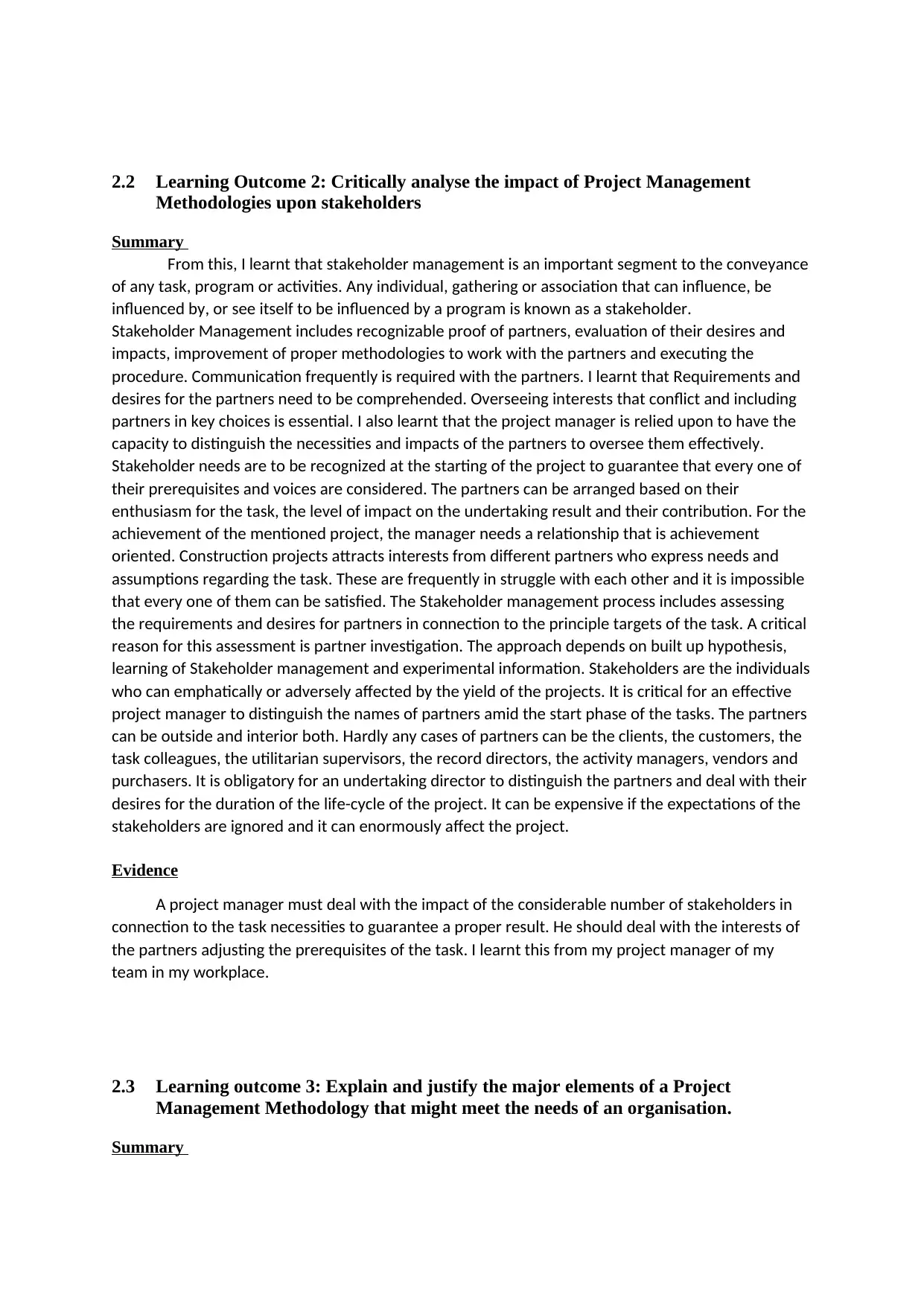
2.2 Learning Outcome 2: Critically analyse the impact of Project Management
Methodologies upon stakeholders
Summary
From this, I learnt that stakeholder management is an important segment to the conveyance
of any task, program or activities. Any individual, gathering or association that can influence, be
influenced by, or see itself to be influenced by a program is known as a stakeholder.
Stakeholder Management includes recognizable proof of partners, evaluation of their desires and
impacts, improvement of proper methodologies to work with the partners and executing the
procedure. Communication frequently is required with the partners. I learnt that Requirements and
desires for the partners need to be comprehended. Overseeing interests that conflict and including
partners in key choices is essential. I also learnt that the project manager is relied upon to have the
capacity to distinguish the necessities and impacts of the partners to oversee them effectively.
Stakeholder needs are to be recognized at the starting of the project to guarantee that every one of
their prerequisites and voices are considered. The partners can be arranged based on their
enthusiasm for the task, the level of impact on the undertaking result and their contribution. For the
achievement of the mentioned project, the manager needs a relationship that is achievement
oriented. Construction projects attracts interests from different partners who express needs and
assumptions regarding the task. These are frequently in struggle with each other and it is impossible
that every one of them can be satisfied. The Stakeholder management process includes assessing
the requirements and desires for partners in connection to the principle targets of the task. A critical
reason for this assessment is partner investigation. The approach depends on built up hypothesis,
learning of Stakeholder management and experimental information. Stakeholders are the individuals
who can emphatically or adversely affected by the yield of the projects. It is critical for an effective
project manager to distinguish the names of partners amid the start phase of the tasks. The partners
can be outside and interior both. Hardly any cases of partners can be the clients, the customers, the
task colleagues, the utilitarian supervisors, the record directors, the activity managers, vendors and
purchasers. It is obligatory for an undertaking director to distinguish the partners and deal with their
desires for the duration of the life-cycle of the project. It can be expensive if the expectations of the
stakeholders are ignored and it can enormously affect the project.
Evidence
A project manager must deal with the impact of the considerable number of stakeholders in
connection to the task necessities to guarantee a proper result. He should deal with the interests of
the partners adjusting the prerequisites of the task. I learnt this from my project manager of my
team in my workplace.
2.3 Learning outcome 3: Explain and justify the major elements of a Project
Management Methodology that might meet the needs of an organisation.
Summary
Methodologies upon stakeholders
Summary
From this, I learnt that stakeholder management is an important segment to the conveyance
of any task, program or activities. Any individual, gathering or association that can influence, be
influenced by, or see itself to be influenced by a program is known as a stakeholder.
Stakeholder Management includes recognizable proof of partners, evaluation of their desires and
impacts, improvement of proper methodologies to work with the partners and executing the
procedure. Communication frequently is required with the partners. I learnt that Requirements and
desires for the partners need to be comprehended. Overseeing interests that conflict and including
partners in key choices is essential. I also learnt that the project manager is relied upon to have the
capacity to distinguish the necessities and impacts of the partners to oversee them effectively.
Stakeholder needs are to be recognized at the starting of the project to guarantee that every one of
their prerequisites and voices are considered. The partners can be arranged based on their
enthusiasm for the task, the level of impact on the undertaking result and their contribution. For the
achievement of the mentioned project, the manager needs a relationship that is achievement
oriented. Construction projects attracts interests from different partners who express needs and
assumptions regarding the task. These are frequently in struggle with each other and it is impossible
that every one of them can be satisfied. The Stakeholder management process includes assessing
the requirements and desires for partners in connection to the principle targets of the task. A critical
reason for this assessment is partner investigation. The approach depends on built up hypothesis,
learning of Stakeholder management and experimental information. Stakeholders are the individuals
who can emphatically or adversely affected by the yield of the projects. It is critical for an effective
project manager to distinguish the names of partners amid the start phase of the tasks. The partners
can be outside and interior both. Hardly any cases of partners can be the clients, the customers, the
task colleagues, the utilitarian supervisors, the record directors, the activity managers, vendors and
purchasers. It is obligatory for an undertaking director to distinguish the partners and deal with their
desires for the duration of the life-cycle of the project. It can be expensive if the expectations of the
stakeholders are ignored and it can enormously affect the project.
Evidence
A project manager must deal with the impact of the considerable number of stakeholders in
connection to the task necessities to guarantee a proper result. He should deal with the interests of
the partners adjusting the prerequisites of the task. I learnt this from my project manager of my
team in my workplace.
2.3 Learning outcome 3: Explain and justify the major elements of a Project
Management Methodology that might meet the needs of an organisation.
Summary
Paraphrase This Document
Need a fresh take? Get an instant paraphrase of this document with our AI Paraphraser
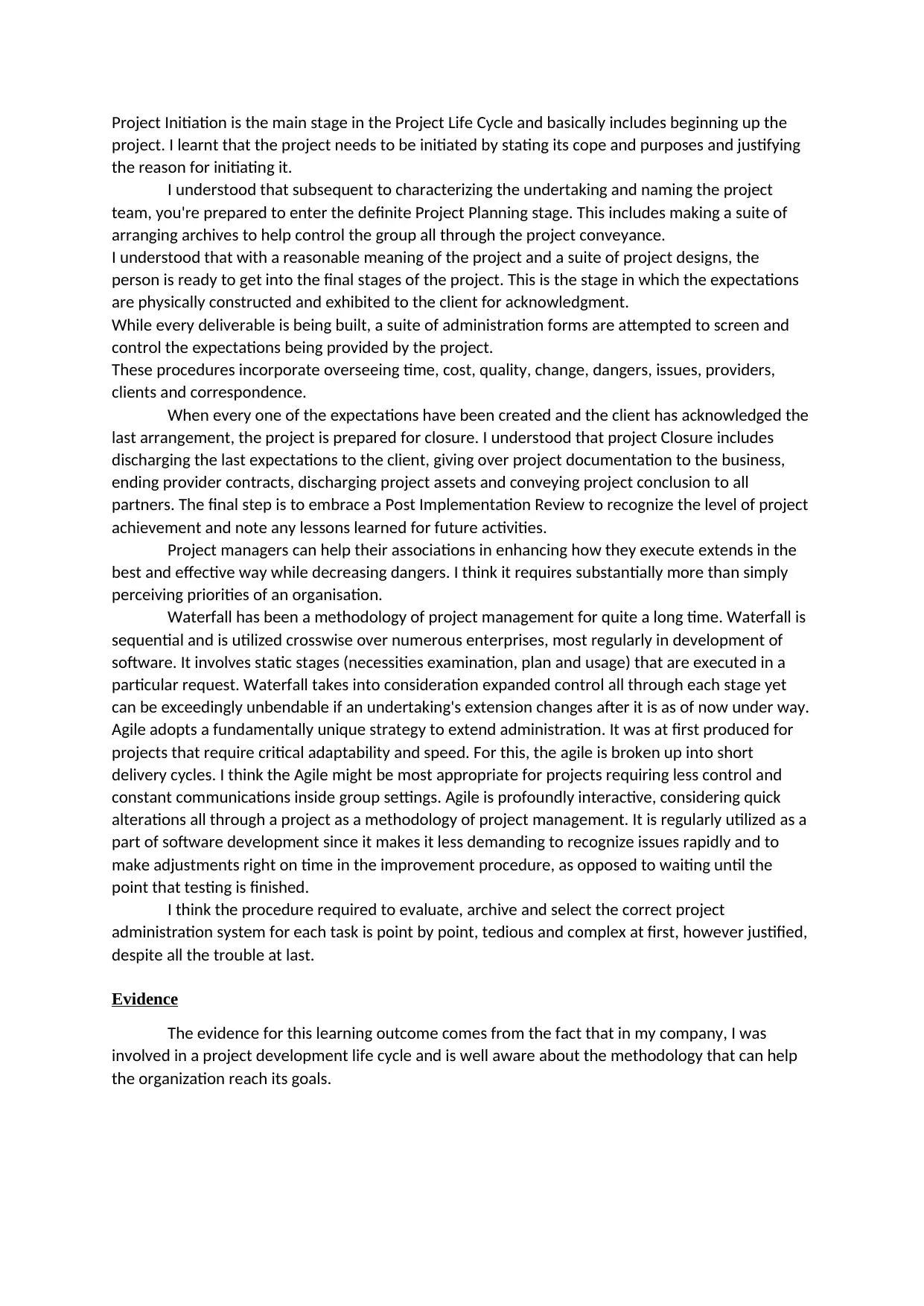
Project Initiation is the main stage in the Project Life Cycle and basically includes beginning up the
project. I learnt that the project needs to be initiated by stating its cope and purposes and justifying
the reason for initiating it.
I understood that subsequent to characterizing the undertaking and naming the project
team, you're prepared to enter the definite Project Planning stage. This includes making a suite of
arranging archives to help control the group all through the project conveyance.
I understood that with a reasonable meaning of the project and a suite of project designs, the
person is ready to get into the final stages of the project. This is the stage in which the expectations
are physically constructed and exhibited to the client for acknowledgment.
While every deliverable is being built, a suite of administration forms are attempted to screen and
control the expectations being provided by the project.
These procedures incorporate overseeing time, cost, quality, change, dangers, issues, providers,
clients and correspondence.
When every one of the expectations have been created and the client has acknowledged the
last arrangement, the project is prepared for closure. I understood that project Closure includes
discharging the last expectations to the client, giving over project documentation to the business,
ending provider contracts, discharging project assets and conveying project conclusion to all
partners. The final step is to embrace a Post Implementation Review to recognize the level of project
achievement and note any lessons learned for future activities.
Project managers can help their associations in enhancing how they execute extends in the
best and effective way while decreasing dangers. I think it requires substantially more than simply
perceiving priorities of an organisation.
Waterfall has been a methodology of project management for quite a long time. Waterfall is
sequential and is utilized crosswise over numerous enterprises, most regularly in development of
software. It involves static stages (necessities examination, plan and usage) that are executed in a
particular request. Waterfall takes into consideration expanded control all through each stage yet
can be exceedingly unbendable if an undertaking's extension changes after it is as of now under way.
Agile adopts a fundamentally unique strategy to extend administration. It was at first produced for
projects that require critical adaptability and speed. For this, the agile is broken up into short
delivery cycles. I think the Agile might be most appropriate for projects requiring less control and
constant communications inside group settings. Agile is profoundly interactive, considering quick
alterations all through a project as a methodology of project management. It is regularly utilized as a
part of software development since it makes it less demanding to recognize issues rapidly and to
make adjustments right on time in the improvement procedure, as opposed to waiting until the
point that testing is finished.
I think the procedure required to evaluate, archive and select the correct project
administration system for each task is point by point, tedious and complex at first, however justified,
despite all the trouble at last.
Evidence
The evidence for this learning outcome comes from the fact that in my company, I was
involved in a project development life cycle and is well aware about the methodology that can help
the organization reach its goals.
project. I learnt that the project needs to be initiated by stating its cope and purposes and justifying
the reason for initiating it.
I understood that subsequent to characterizing the undertaking and naming the project
team, you're prepared to enter the definite Project Planning stage. This includes making a suite of
arranging archives to help control the group all through the project conveyance.
I understood that with a reasonable meaning of the project and a suite of project designs, the
person is ready to get into the final stages of the project. This is the stage in which the expectations
are physically constructed and exhibited to the client for acknowledgment.
While every deliverable is being built, a suite of administration forms are attempted to screen and
control the expectations being provided by the project.
These procedures incorporate overseeing time, cost, quality, change, dangers, issues, providers,
clients and correspondence.
When every one of the expectations have been created and the client has acknowledged the
last arrangement, the project is prepared for closure. I understood that project Closure includes
discharging the last expectations to the client, giving over project documentation to the business,
ending provider contracts, discharging project assets and conveying project conclusion to all
partners. The final step is to embrace a Post Implementation Review to recognize the level of project
achievement and note any lessons learned for future activities.
Project managers can help their associations in enhancing how they execute extends in the
best and effective way while decreasing dangers. I think it requires substantially more than simply
perceiving priorities of an organisation.
Waterfall has been a methodology of project management for quite a long time. Waterfall is
sequential and is utilized crosswise over numerous enterprises, most regularly in development of
software. It involves static stages (necessities examination, plan and usage) that are executed in a
particular request. Waterfall takes into consideration expanded control all through each stage yet
can be exceedingly unbendable if an undertaking's extension changes after it is as of now under way.
Agile adopts a fundamentally unique strategy to extend administration. It was at first produced for
projects that require critical adaptability and speed. For this, the agile is broken up into short
delivery cycles. I think the Agile might be most appropriate for projects requiring less control and
constant communications inside group settings. Agile is profoundly interactive, considering quick
alterations all through a project as a methodology of project management. It is regularly utilized as a
part of software development since it makes it less demanding to recognize issues rapidly and to
make adjustments right on time in the improvement procedure, as opposed to waiting until the
point that testing is finished.
I think the procedure required to evaluate, archive and select the correct project
administration system for each task is point by point, tedious and complex at first, however justified,
despite all the trouble at last.
Evidence
The evidence for this learning outcome comes from the fact that in my company, I was
involved in a project development life cycle and is well aware about the methodology that can help
the organization reach its goals.

3 DISCUSSION AND CONCLUSION
Throughout 12 weeks of learning about project management methodologies, I have
understood the fundamental knowledge of project management and other critical aspects. The need
for a project manager to be better and accurate in every field have been mentioned. The role of a
project manager has been assessed in the portfolios and their roles have been evaluated
accordingly. In the mentioned consolidated portfolio, the different methodologies have been
discussed and the reason why they are employed to tackle the impact of stakeholders has been
evaluated.
Throughout 12 weeks of learning about project management methodologies, I have
understood the fundamental knowledge of project management and other critical aspects. The need
for a project manager to be better and accurate in every field have been mentioned. The role of a
project manager has been assessed in the portfolios and their roles have been evaluated
accordingly. In the mentioned consolidated portfolio, the different methodologies have been
discussed and the reason why they are employed to tackle the impact of stakeholders has been
evaluated.
⊘ This is a preview!⊘
Do you want full access?
Subscribe today to unlock all pages.

Trusted by 1+ million students worldwide
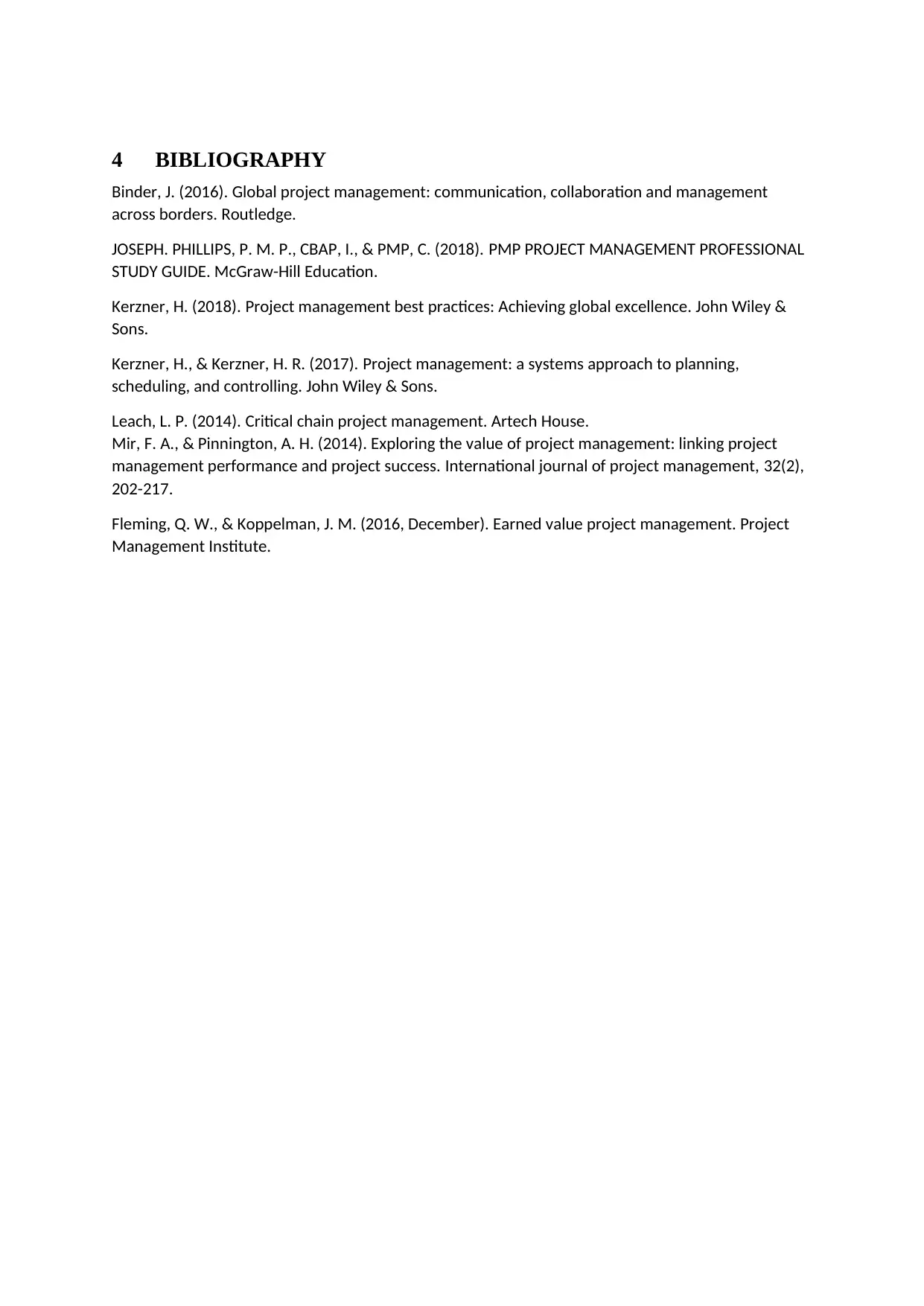
4 BIBLIOGRAPHY
Binder, J. (2016). Global project management: communication, collaboration and management
across borders. Routledge.
JOSEPH. PHILLIPS, P. M. P., CBAP, I., & PMP, C. (2018). PMP PROJECT MANAGEMENT PROFESSIONAL
STUDY GUIDE. McGraw-Hill Education.
Kerzner, H. (2018). Project management best practices: Achieving global excellence. John Wiley &
Sons.
Kerzner, H., & Kerzner, H. R. (2017). Project management: a systems approach to planning,
scheduling, and controlling. John Wiley & Sons.
Leach, L. P. (2014). Critical chain project management. Artech House.
Mir, F. A., & Pinnington, A. H. (2014). Exploring the value of project management: linking project
management performance and project success. International journal of project management, 32(2),
202-217.
Fleming, Q. W., & Koppelman, J. M. (2016, December). Earned value project management. Project
Management Institute.
Binder, J. (2016). Global project management: communication, collaboration and management
across borders. Routledge.
JOSEPH. PHILLIPS, P. M. P., CBAP, I., & PMP, C. (2018). PMP PROJECT MANAGEMENT PROFESSIONAL
STUDY GUIDE. McGraw-Hill Education.
Kerzner, H. (2018). Project management best practices: Achieving global excellence. John Wiley &
Sons.
Kerzner, H., & Kerzner, H. R. (2017). Project management: a systems approach to planning,
scheduling, and controlling. John Wiley & Sons.
Leach, L. P. (2014). Critical chain project management. Artech House.
Mir, F. A., & Pinnington, A. H. (2014). Exploring the value of project management: linking project
management performance and project success. International journal of project management, 32(2),
202-217.
Fleming, Q. W., & Koppelman, J. M. (2016, December). Earned value project management. Project
Management Institute.
Paraphrase This Document
Need a fresh take? Get an instant paraphrase of this document with our AI Paraphraser
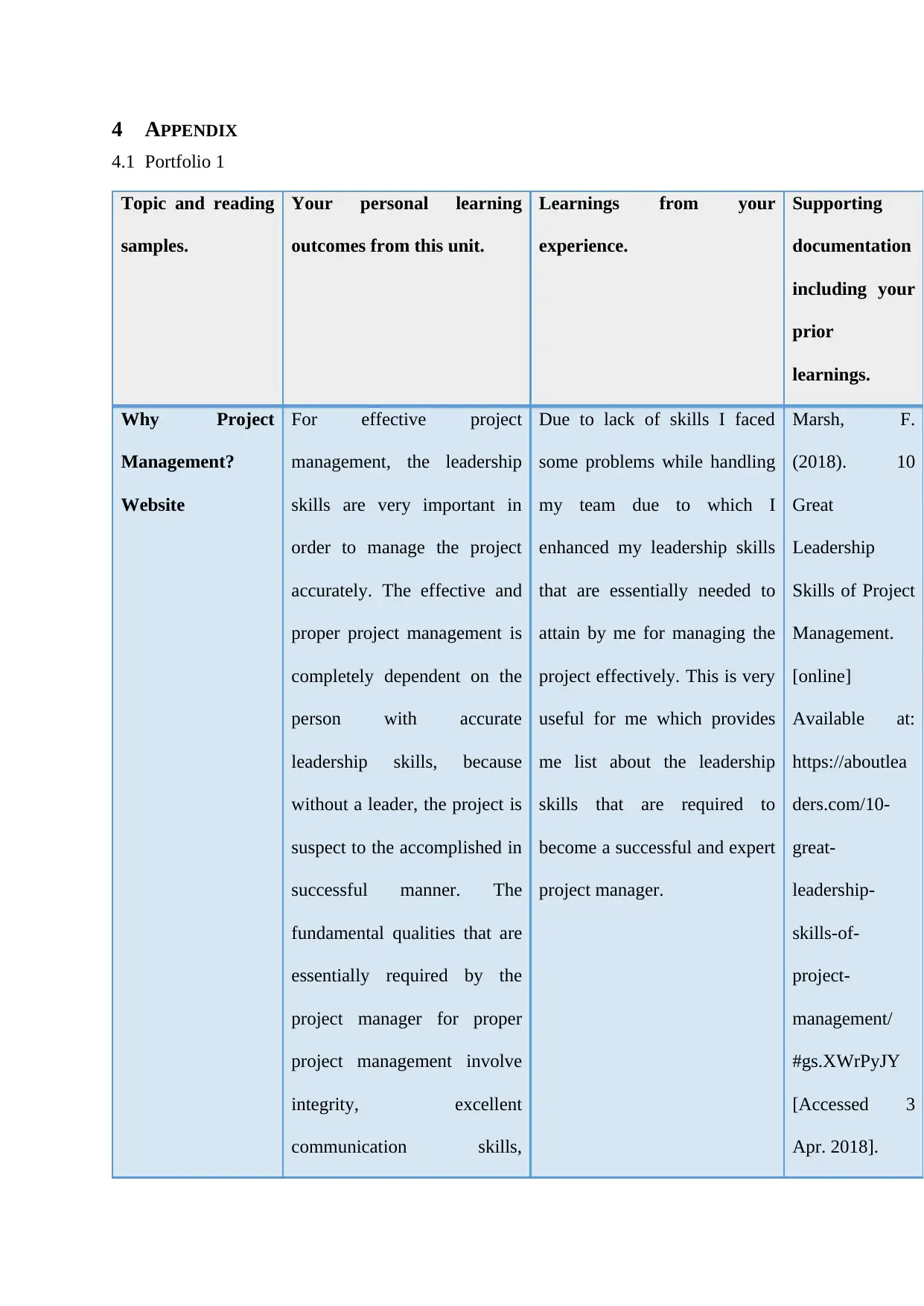
4 APPENDIX
4.1 Portfolio 1
Topic and reading
samples.
Your personal learning
outcomes from this unit.
Learnings from your
experience.
Supporting
documentation
including your
prior
learnings.
Why Project
Management?
Website
For effective project
management, the leadership
skills are very important in
order to manage the project
accurately. The effective and
proper project management is
completely dependent on the
person with accurate
leadership skills, because
without a leader, the project is
suspect to the accomplished in
successful manner. The
fundamental qualities that are
essentially required by the
project manager for proper
project management involve
integrity, excellent
communication skills,
Due to lack of skills I faced
some problems while handling
my team due to which I
enhanced my leadership skills
that are essentially needed to
attain by me for managing the
project effectively. This is very
useful for me which provides
me list about the leadership
skills that are required to
become a successful and expert
project manager.
Marsh, F.
(2018). 10
Great
Leadership
Skills of Project
Management.
[online]
Available at:
https://aboutlea
ders.com/10-
great-
leadership-
skills-of-
project-
management/
#gs.XWrPyJY
[Accessed 3
Apr. 2018].
4.1 Portfolio 1
Topic and reading
samples.
Your personal learning
outcomes from this unit.
Learnings from your
experience.
Supporting
documentation
including your
prior
learnings.
Why Project
Management?
Website
For effective project
management, the leadership
skills are very important in
order to manage the project
accurately. The effective and
proper project management is
completely dependent on the
person with accurate
leadership skills, because
without a leader, the project is
suspect to the accomplished in
successful manner. The
fundamental qualities that are
essentially required by the
project manager for proper
project management involve
integrity, excellent
communication skills,
Due to lack of skills I faced
some problems while handling
my team due to which I
enhanced my leadership skills
that are essentially needed to
attain by me for managing the
project effectively. This is very
useful for me which provides
me list about the leadership
skills that are required to
become a successful and expert
project manager.
Marsh, F.
(2018). 10
Great
Leadership
Skills of Project
Management.
[online]
Available at:
https://aboutlea
ders.com/10-
great-
leadership-
skills-of-
project-
management/
#gs.XWrPyJY
[Accessed 3
Apr. 2018].
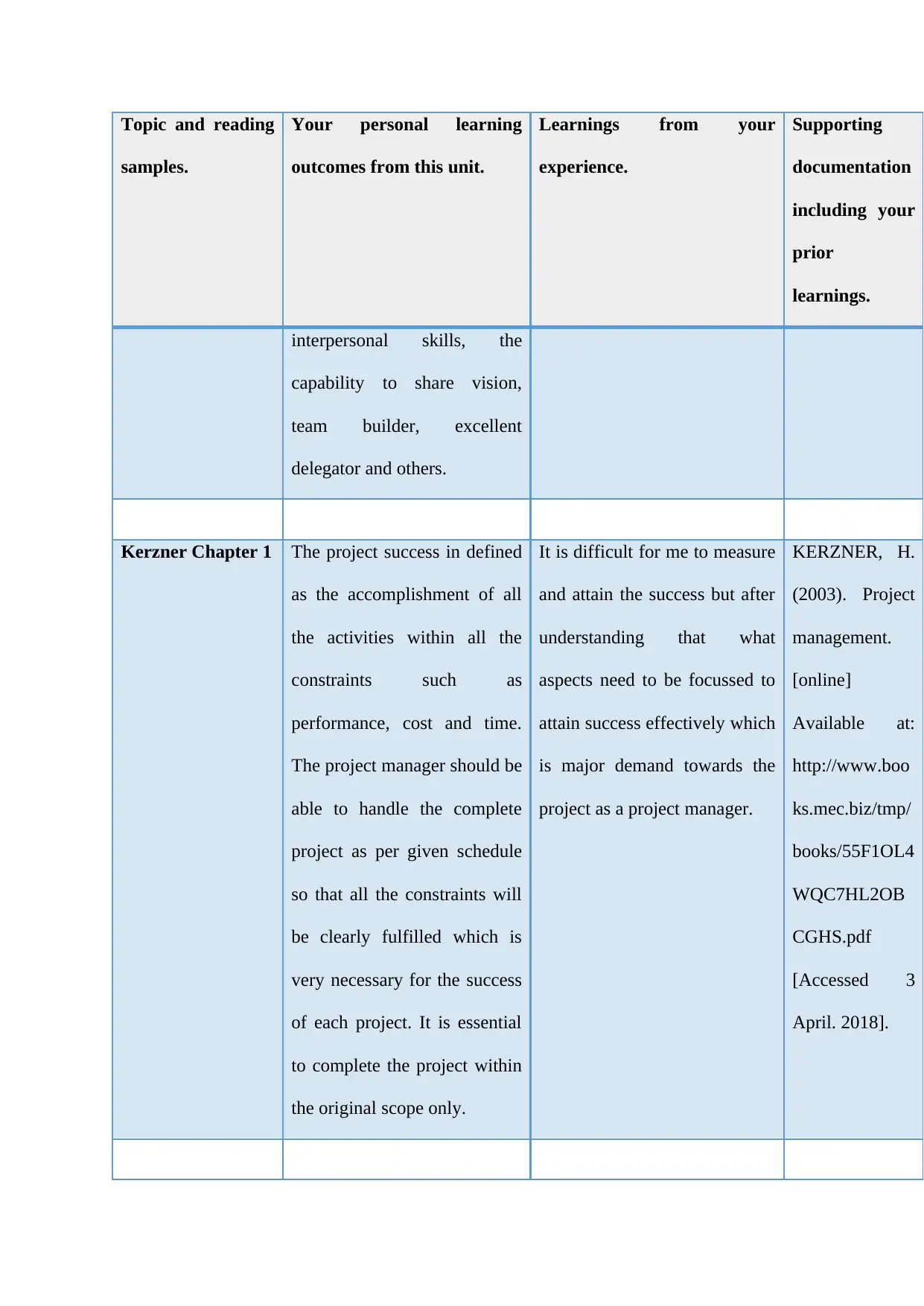
Topic and reading
samples.
Your personal learning
outcomes from this unit.
Learnings from your
experience.
Supporting
documentation
including your
prior
learnings.
interpersonal skills, the
capability to share vision,
team builder, excellent
delegator and others.
Kerzner Chapter 1 The project success in defined
as the accomplishment of all
the activities within all the
constraints such as
performance, cost and time.
The project manager should be
able to handle the complete
project as per given schedule
so that all the constraints will
be clearly fulfilled which is
very necessary for the success
of each project. It is essential
to complete the project within
the original scope only.
It is difficult for me to measure
and attain the success but after
understanding that what
aspects need to be focussed to
attain success effectively which
is major demand towards the
project as a project manager.
KERZNER, H.
(2003). Project
management.
[online]
Available at:
http://www.boo
ks.mec.biz/tmp/
books/55F1OL4
WQC7HL2OB
CGHS.pdf
[Accessed 3
April. 2018].
samples.
Your personal learning
outcomes from this unit.
Learnings from your
experience.
Supporting
documentation
including your
prior
learnings.
interpersonal skills, the
capability to share vision,
team builder, excellent
delegator and others.
Kerzner Chapter 1 The project success in defined
as the accomplishment of all
the activities within all the
constraints such as
performance, cost and time.
The project manager should be
able to handle the complete
project as per given schedule
so that all the constraints will
be clearly fulfilled which is
very necessary for the success
of each project. It is essential
to complete the project within
the original scope only.
It is difficult for me to measure
and attain the success but after
understanding that what
aspects need to be focussed to
attain success effectively which
is major demand towards the
project as a project manager.
KERZNER, H.
(2003). Project
management.
[online]
Available at:
http://www.boo
ks.mec.biz/tmp/
books/55F1OL4
WQC7HL2OB
CGHS.pdf
[Accessed 3
April. 2018].
⊘ This is a preview!⊘
Do you want full access?
Subscribe today to unlock all pages.

Trusted by 1+ million students worldwide

Topic and reading
samples.
Your personal learning
outcomes from this unit.
Learnings from your
experience.
Supporting
documentation
including your
prior
learnings.
Egelstaff (2013)
Academic
assignments:
Critical thinking
and writing
critically
Critical thinking and writing
involve various types of
essays, papers, assignments
and others. These all need to
be done carefully in order to
get accurate results. In order to
write this, proper knowledge
and skills are very important
in the person so that all things
can be done accurately.
In last assignment I got very
less marks due to some
problems in my assignment but
after recognizing it that the
critical thinking is very
important, I easily got good
marks in my next assignments.
Egelstaff, R.
(2013).
Preparing and
Writing
Academic
Assignments -
Richard
Egelstaff.
[online]
YouTube.
Available at:
https://www.yo
utube.com/watc
h?
v=I5UYb3d094
M [Accessed 3
Apr. 2018].
Project
Management
It is a demand of every project
manager to become accurate
It helps me to be a perfect in
the field of project manager
White, D. and
Fortune, J.
samples.
Your personal learning
outcomes from this unit.
Learnings from your
experience.
Supporting
documentation
including your
prior
learnings.
Egelstaff (2013)
Academic
assignments:
Critical thinking
and writing
critically
Critical thinking and writing
involve various types of
essays, papers, assignments
and others. These all need to
be done carefully in order to
get accurate results. In order to
write this, proper knowledge
and skills are very important
in the person so that all things
can be done accurately.
In last assignment I got very
less marks due to some
problems in my assignment but
after recognizing it that the
critical thinking is very
important, I easily got good
marks in my next assignments.
Egelstaff, R.
(2013).
Preparing and
Writing
Academic
Assignments -
Richard
Egelstaff.
[online]
YouTube.
Available at:
https://www.yo
utube.com/watc
h?
v=I5UYb3d094
M [Accessed 3
Apr. 2018].
Project
Management
It is a demand of every project
manager to become accurate
It helps me to be a perfect in
the field of project manager
White, D. and
Fortune, J.
Paraphrase This Document
Need a fresh take? Get an instant paraphrase of this document with our AI Paraphraser
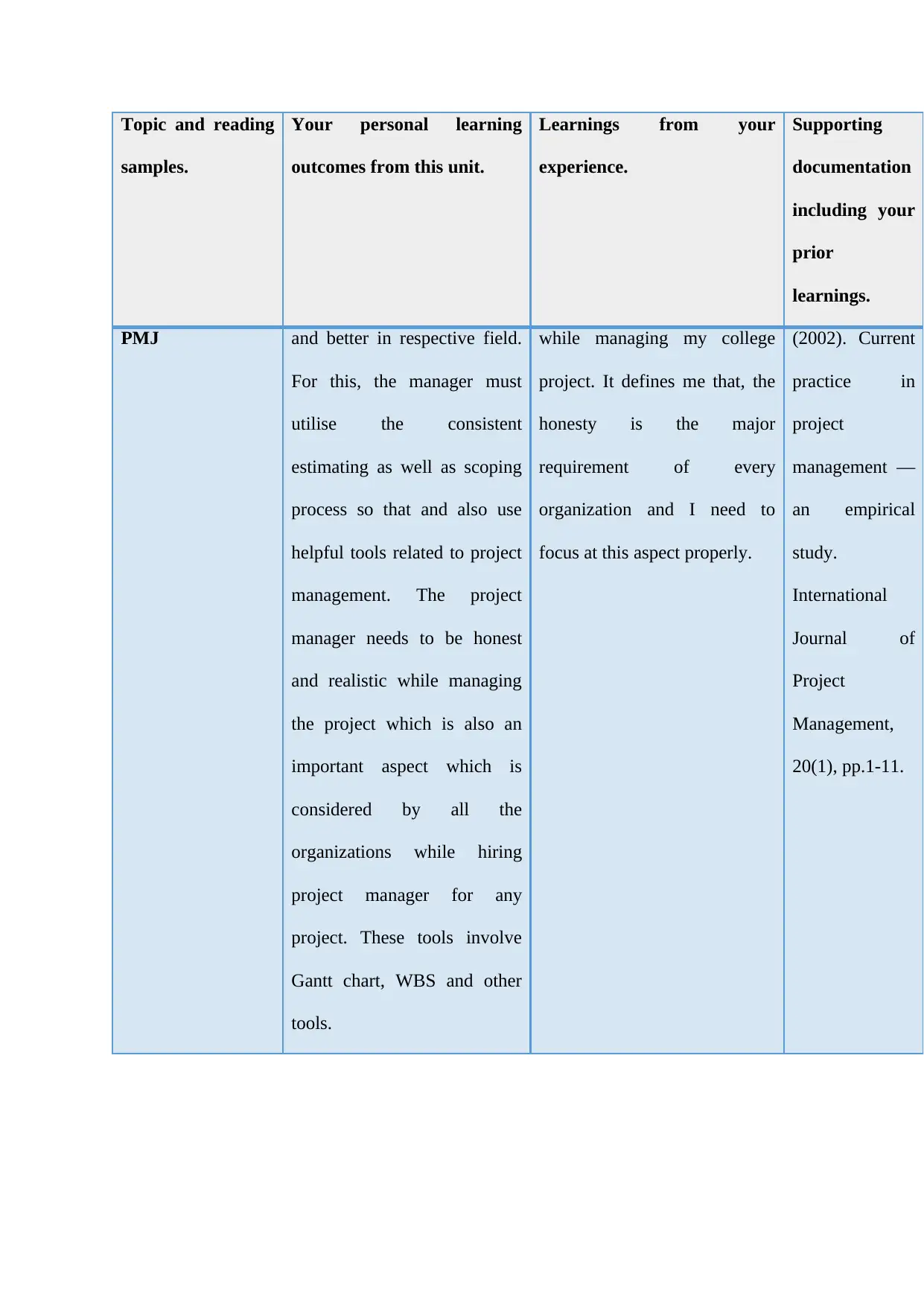
Topic and reading
samples.
Your personal learning
outcomes from this unit.
Learnings from your
experience.
Supporting
documentation
including your
prior
learnings.
PMJ and better in respective field.
For this, the manager must
utilise the consistent
estimating as well as scoping
process so that and also use
helpful tools related to project
management. The project
manager needs to be honest
and realistic while managing
the project which is also an
important aspect which is
considered by all the
organizations while hiring
project manager for any
project. These tools involve
Gantt chart, WBS and other
tools.
while managing my college
project. It defines me that, the
honesty is the major
requirement of every
organization and I need to
focus at this aspect properly.
(2002). Current
practice in
project
management —
an empirical
study.
International
Journal of
Project
Management,
20(1), pp.1-11.
samples.
Your personal learning
outcomes from this unit.
Learnings from your
experience.
Supporting
documentation
including your
prior
learnings.
PMJ and better in respective field.
For this, the manager must
utilise the consistent
estimating as well as scoping
process so that and also use
helpful tools related to project
management. The project
manager needs to be honest
and realistic while managing
the project which is also an
important aspect which is
considered by all the
organizations while hiring
project manager for any
project. These tools involve
Gantt chart, WBS and other
tools.
while managing my college
project. It defines me that, the
honesty is the major
requirement of every
organization and I need to
focus at this aspect properly.
(2002). Current
practice in
project
management —
an empirical
study.
International
Journal of
Project
Management,
20(1), pp.1-11.
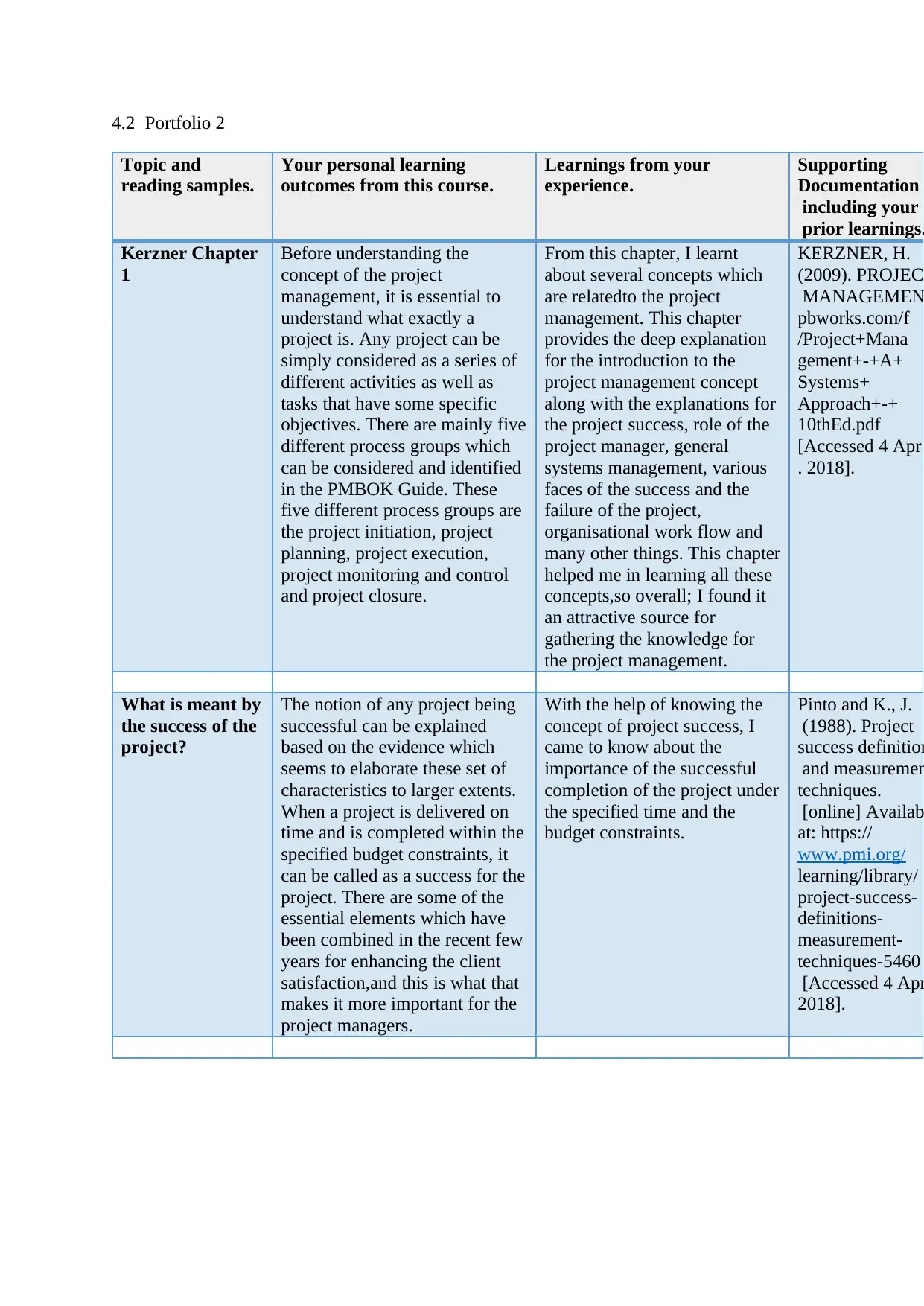
4.2 Portfolio 2
Topic and
reading samples.
Your personal learning
outcomes from this course.
Learnings from your
experience.
Supporting
Documentation
including your
prior learnings.
Kerzner Chapter
1
Before understanding the
concept of the project
management, it is essential to
understand what exactly a
project is. Any project can be
simply considered as a series of
different activities as well as
tasks that have some specific
objectives. There are mainly five
different process groups which
can be considered and identified
in the PMBOK Guide. These
five different process groups are
the project initiation, project
planning, project execution,
project monitoring and control
and project closure.
From this chapter, I learnt
about several concepts which
are relatedto the project
management. This chapter
provides the deep explanation
for the introduction to the
project management concept
along with the explanations for
the project success, role of the
project manager, general
systems management, various
faces of the success and the
failure of the project,
organisational work flow and
many other things. This chapter
helped me in learning all these
concepts,so overall; I found it
an attractive source for
gathering the knowledge for
the project management.
KERZNER, H.
(2009). PROJEC
MANAGEMEN
pbworks.com/f
/Project+Mana
gement+-+A+
Systems+
Approach+-+
10thEd.pdf
[Accessed 4 Apr
. 2018].
What is meant by
the success of the
project?
The notion of any project being
successful can be explained
based on the evidence which
seems to elaborate these set of
characteristics to larger extents.
When a project is delivered on
time and is completed within the
specified budget constraints, it
can be called as a success for the
project. There are some of the
essential elements which have
been combined in the recent few
years for enhancing the client
satisfaction,and this is what that
makes it more important for the
project managers.
With the help of knowing the
concept of project success, I
came to know about the
importance of the successful
completion of the project under
the specified time and the
budget constraints.
Pinto and K., J.
(1988). Project
success definition
and measuremen
techniques.
[online] Availab
at: https://
www.pmi.org/
learning/library/
project-success-
definitions-
measurement-
techniques-5460
[Accessed 4 Apr
2018].
Topic and
reading samples.
Your personal learning
outcomes from this course.
Learnings from your
experience.
Supporting
Documentation
including your
prior learnings.
Kerzner Chapter
1
Before understanding the
concept of the project
management, it is essential to
understand what exactly a
project is. Any project can be
simply considered as a series of
different activities as well as
tasks that have some specific
objectives. There are mainly five
different process groups which
can be considered and identified
in the PMBOK Guide. These
five different process groups are
the project initiation, project
planning, project execution,
project monitoring and control
and project closure.
From this chapter, I learnt
about several concepts which
are relatedto the project
management. This chapter
provides the deep explanation
for the introduction to the
project management concept
along with the explanations for
the project success, role of the
project manager, general
systems management, various
faces of the success and the
failure of the project,
organisational work flow and
many other things. This chapter
helped me in learning all these
concepts,so overall; I found it
an attractive source for
gathering the knowledge for
the project management.
KERZNER, H.
(2009). PROJEC
MANAGEMEN
pbworks.com/f
/Project+Mana
gement+-+A+
Systems+
Approach+-+
10thEd.pdf
[Accessed 4 Apr
. 2018].
What is meant by
the success of the
project?
The notion of any project being
successful can be explained
based on the evidence which
seems to elaborate these set of
characteristics to larger extents.
When a project is delivered on
time and is completed within the
specified budget constraints, it
can be called as a success for the
project. There are some of the
essential elements which have
been combined in the recent few
years for enhancing the client
satisfaction,and this is what that
makes it more important for the
project managers.
With the help of knowing the
concept of project success, I
came to know about the
importance of the successful
completion of the project under
the specified time and the
budget constraints.
Pinto and K., J.
(1988). Project
success definition
and measuremen
techniques.
[online] Availab
at: https://
www.pmi.org/
learning/library/
project-success-
definitions-
measurement-
techniques-5460
[Accessed 4 Apr
2018].
⊘ This is a preview!⊘
Do you want full access?
Subscribe today to unlock all pages.

Trusted by 1+ million students worldwide
1 out of 38
Related Documents
Your All-in-One AI-Powered Toolkit for Academic Success.
+13062052269
info@desklib.com
Available 24*7 on WhatsApp / Email
![[object Object]](/_next/static/media/star-bottom.7253800d.svg)
Unlock your academic potential
Copyright © 2020–2026 A2Z Services. All Rights Reserved. Developed and managed by ZUCOL.
